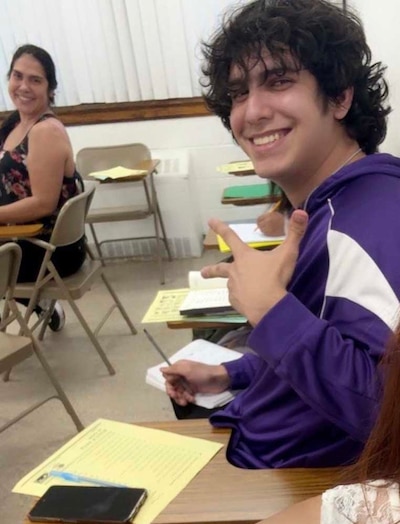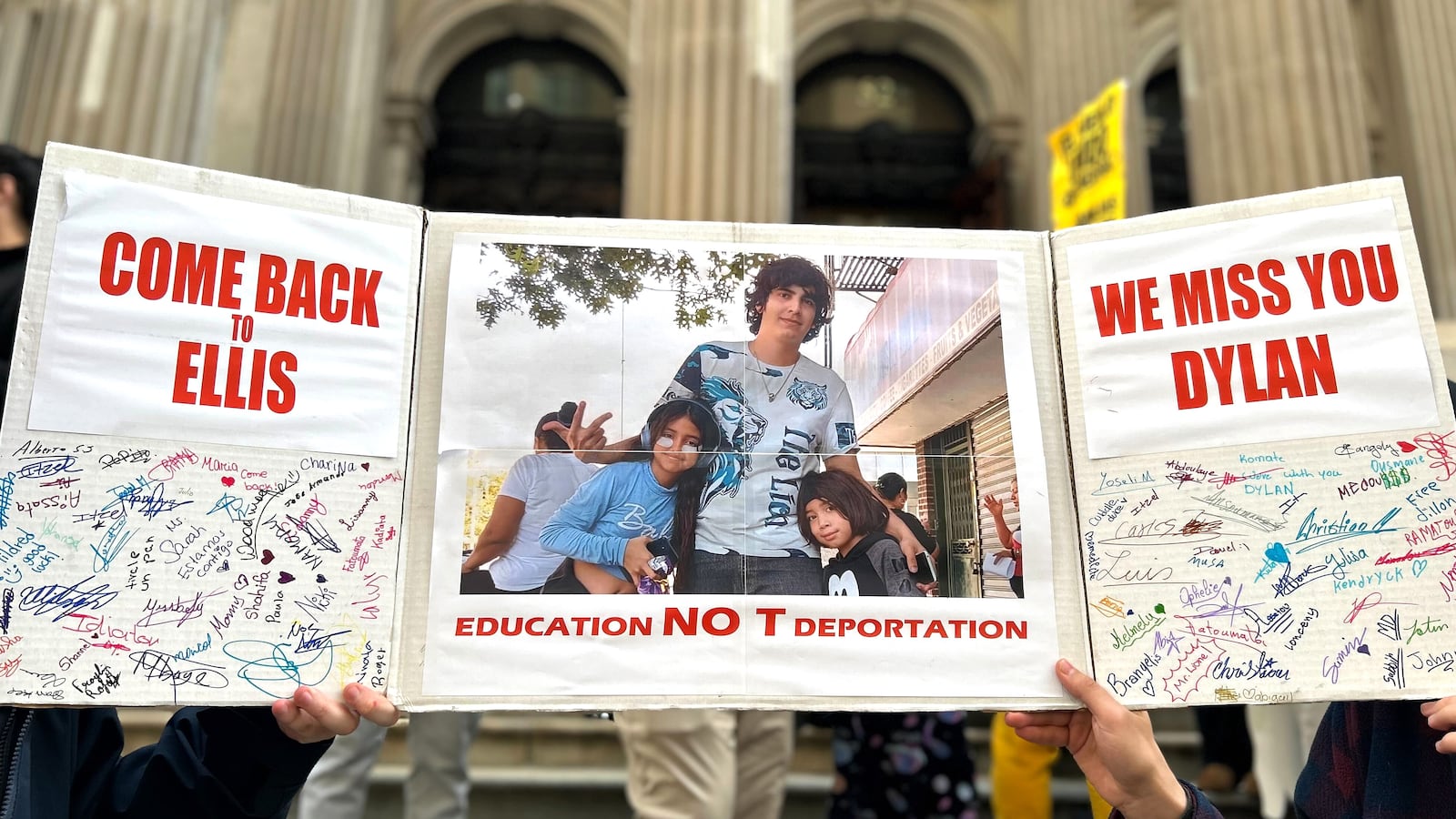Sign up for Chalkbeat New York’s free daily newsletter to get essential news about NYC’s public schools delivered to your inbox.
Three months in detention have taken a toll on Dylan Lopez Contreras, the New York City student arrested by federal immigration agents in May.
But letters from his classmates have been a balm, he said in an interview with Chalkbeat, the first he’s given since his arrest.
“The letters I have received and the support I’ve been given have kept me going,” the 20-year-old said in Spanish, responding to questions in writing through his attorneys at the New York Legal Assistance Group. “Still, it is extremely stressful and distressing. I have seen fights, racism, and even death. It has given me many nightmares.”
Dylan turned himself in at the U.S. border in April 2024 after a trek from Venezuela. He requested asylum and was permitted to enter the country, making his way to New York and enrolling in ELLIS Preparatory Academy. He was arrested by Immigration and Customs Enforcement, or ICE, in May at a routine court date and has spent most of the past three months at Pennsylvania’s Moshannon Valley Processing Center, the largest detention facility in the Northeast.
Chalkbeat broke the news of Dylan’s arrest, which became a vivid illustration of how the Trump administration’s immigration crackdown is playing out in New York City and affecting students. Chalkbeat has also chronicled how the students and staff at ELLIS, a Bronx high school school that enrolls students who have been in the country less than a year, rallied to his defense, raising money for his case and sending him letters.

“I never imagined I would receive so much support,” Dylan wrote. “Honestly, it felt very beautiful and hopeful.”
Dylan’s asylum case continues Monday, when he is expected to be back in immigration court. The hearing could determine whether he’s released from detention or deported.
Hundreds of young New Yorkers detained this year
When President Donald Trump took office, he vowed to “begin the process of returning millions and millions of criminal aliens back to the places from which they came.” Months later, many immigrants — who, like Dylan, were without legal status but also had no criminal histories — were detained at Lower Manhattan’s 26 Federal Plaza and other courthouses across the nation at routine immigration hearings.
The Trump administration has described that as a “common-sense” approach, enabling them to find their targets without having to fan out into neighborhoods, and said they are fulfilling the promise of mass deportations that fueled Trump’s campaign victory.
Department of Homeland Security officials did not immediately respond to questions about Dylan’s case or Moshannon Valley.
Since ICE detained Dylan in May, other arrests of New York City youth — and deportations — have followed.
The city’s Education Department said they could not share how many public school students have been detained by ICE, especially since they do not track or ask families to disclose country of origin or immigration status.
This year, ICE has detained about 275 people in New York City who were born in 2004 or later, according to government data provided by ICE in response to a public records request to the Deportation Data Project and analyzed by Chalkbeat. Most of those detained were male, and roughly two-thirds were from Latin America. Three- and 4-year-olds were among those detained from Chile, Colombia, Ecuador, Honduras, and Venezuela.
In August, a 6-year-old who attended P.S. 89 in Queens was deported to Ecuador with her mother, according to reports. That same month, Mamadou Mouctar, a 20-year-old from Guinea who attended Brooklyn’s Frontiers High School, was detained. As in Dylan’s case, educators and city leaders spoke out in support.
From Bronx classroom to detention cell
Dylan said his days at Moshannon Valley have been monotonous: late night and early morning head counts and trying to make little noise to avoid being told by the other 60 or so people in his cell to be quiet. (Hundreds of protesters gathered near the facility last month calling for its closure, following a federal complaint filed against Moshannon Valley over insufficient medical and mental health care and inadequate translation services.)
“The majority of the people here are depressed,” Dylan wrote. “They spend most of the time talking about their last, or next, court decision, their family outside, or the injustice of being here.”

Before Dylan’s arrest, he was focused on his studies and helping his mom care for his two younger siblings, in part, through the money he made working as a delivery driver. He was busy making friends at ELLIS, sharing his arepas at lunch with them. He said he hoped to continue learning English to pursue a degree in the U.S. — a goal he said he still plans to work toward.
“This unjust detention has frustrated and paralyzed my education and effort momentarily,” Dylan said. “But it won’t make me give up on working hard toward my educational goals.”
Dylan dreams of a day he might be released and be able to hug his family, eat good food, and sleep well. He also joked about having to make up ground after losing his 230-day Duolingo streak.
Dylan said he wanted Trump to remember that immigrants contribute to the economy, and he argued that the money being spent on an immigration crackdown could be dedicated to other things like education. At the start of the summer, Congress approved a spending bill that set aside an unprecedented $170 billion for immigration enforcement.
“I understand the president’s point of wanting his country to be better, but he must remember that this is a nation of migrants, built by them,” he wrote.
It’s possible that Dylan’s hearing on Monday will not yield an immediate outcome, members of his legal team said. The team plans to present detailed testimony and evidence supporting his asylum claim, which could extend the timeline for a resolution. There’s also a chance he could remain in detention if he wins asylum, but the Department of Homeland Security files an appeal. He also could appeal if he’s denied asylum.
Chalkbeat Senior Data Editor Thomas Wilburn contributed.
Michael Elsen-Rooney is a reporter for Chalkbeat New York, covering NYC public schools. Contact Michael at melsen-rooney@chalkbeat.org.
Amy Zimmer is the bureau chief for Chalkbeat New York. Contact Amy atazimmer@chalkbeat.org.

